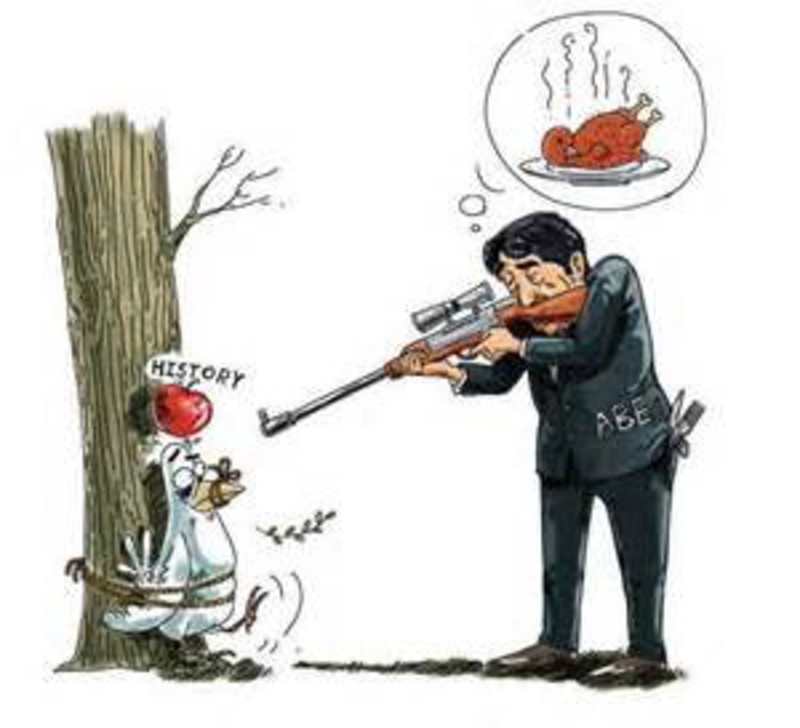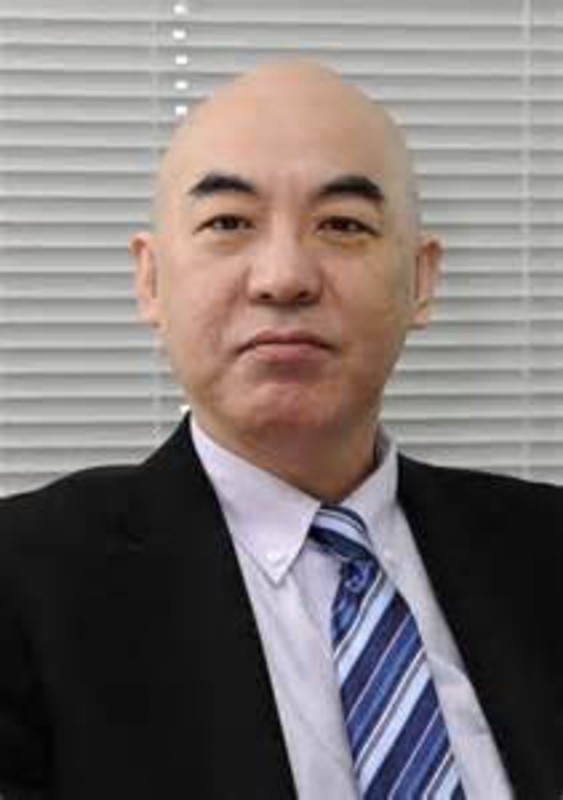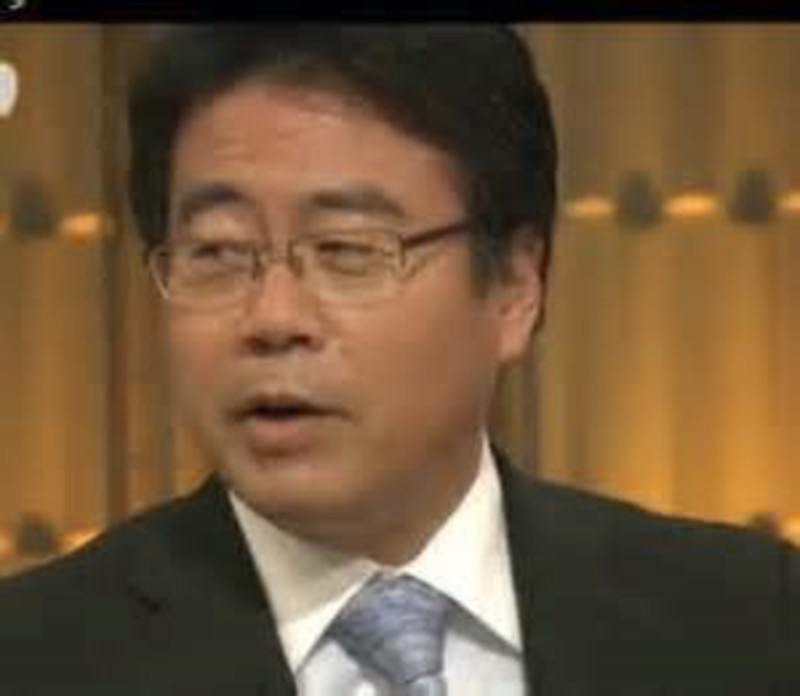Jeff Kingston
In an April 2, 2015 essay in the Number One Shimbun published by the Foreign Correspondent’s Club of Japan, veteran German journalist Carsten Germis shares his experiences of being harassed by the Japanese government basically for doing his job. In his view, the Abe government is overly sensitive to criticism and responds aggressively in trying to suppress such views. Team Abe has been especially sensitive to criticism about what Germis terms, “a move by the right to whitewash history.” Germis served in Tokyo from 2010-15, but I only met him once very briefly and have not read his articles in German, so am not in a position to judge the content or analysis, but his allegations of government meddling with the press are serious.
Officials everywhere get testy about negative coverage and Japan is certainly not the only country where journalists are singled out for harassment. Journalists who have worked in China have many stories to tell about intrusive monitoring and restrictions that make reporting the news in Japan seem relatively easy and pleasant. But everyone knows that China is not democratic and doesn’t tolerate a free press while it is generally assumed Japan does. Perhaps even more than in Japan, the South Korean government is also cracking down on the media, singling out critics of Park Geun-hye, demonstrating yet again how these ‘frenemies’ are more alike than either one cares to admit.
The intolerance towards criticism is based on the erroneous belief that all criticism of Japanese government actions equals anti-Japanese sentiment. There is also a presumption that journalists are “guests” who should be polite to their hosts while scholars who take Japanese research money also risk being labeled traitors if they express critical views. In 21st century Japan, there is far too much official paranoia that all criticism of Japan is aiding and abetting China and Korea.
In these times those who criticize Abe are often accused of Japan-bashing and venality. This is a convenient way to marginalize critical voices, suggesting that they have insidious motives and are helping, as alleged in the Germis case, Chinese propagandists in exchange for money and favors. It doesn’t seem to matter that no evidence was presented or that such allegations are demonstrably untrue. And, as Germis relates, it doesn’t even matter if you have facts to back up your story; officials are in the embarrassing situation of dismissing government statistics if they don’t support their view.
Labeling critics as Japan-bashers evades engaging the arguments and the facts and instead relies on cheap shot ad hominem attacks. This shabby tactic defines criticism of Abe as criticism of Japan putting journalists in the awkward position of having to demonstrate “love” for Japan. No journalist in a democracy should face a loyalty test.
Ironically, public opinion polls reveal that the majority of Japanese people oppose every one of Abe’s signature policies so criticizing those policies is not exactly a case of nattering nabobs skewing the debate. Agreeing with the Japanese public and giving them a voice is ‘subversive’, however, because it counters the efforts of the PR spin masters. That, apparently, is exactly what Team Abe worries about and what they don’t want conveyed to the world.
Officials have warned journalists, including Germis, not to interview Nakano Koichi, a respected political scientist at Sophia University. Nakano’s critical assessments of PM Abe’s policies and revisionist views on history are widely quoted. The government’s press handler asserted that he is unreliable and steered journalists to sources that toe the government line, including a free lance foreign journalist who appeared on the scene in 2014 with no prior experience in Japan. Other foreign journalists confide that they have felt pressure and know that their reporting might jeopardize gaining access, as blacklisted reporters/newspapers don’t get interviews with Abe or his inner circle. Some current and ex-government officials confide that they personally think Team Abe’s effort to more aggressively assert revisionist history is counterproductive and tarnishing Japan’s international image. But they do as they are told and suggest that some of their colleagues and superiors actually support such efforts and thus make it difficult to speak truth to power.
When was the last time that the NY Times got an interview with any sitting Japanese prime minister? Martin Fackler, the current bureau chief in Tokyo for the New York Times, says that in 2009 he was asked by the government to write a self-criticism of the newspaper because of his predecessor’s unwelcome reporting about the comfort women. Naturally he did not do so and the prime minister’s office gives him a cold shoulder while the MOFA media minder gives him a hard time about his reporting. Fackler says,” it’s completely self-defeating for Japan: it doesn’t prevent me from writing what I want, and in fact has the opposite effect of denying the Japanese government a chance to get their side more fully into our stories.”
So the forces of darkness were gathering before Abe reemerged in 2012, but they appear to be gaining momentum. The concerted campaign in 2014 to discredit the Asahi newspaper by its conservative media rivals enjoyed the vocal support of Abe and reactionaries have become emboldened on his watch. (Nishino and Nogawa 2014)
Abe takes aim at history and peace
It is rumored that the NHK NewsWatch 9pm News anchor Okoshi Kensuke was ousted from his post because he was considered biased by Abe supporters, citing among other transgressions his anti-nuclear energy comments and blogging about the killing of two Japanese in January 2015 by the Islamic State that indicated some reservations about Abe’s handling of the hostage crisis. Okoshi has held this slot since 2011 so is this just the normal rotation of staff?
Hyakuta Naoki, conservative writer and former NHK Governor
Okoshi Kensuke, ousted NHK anchor
In July 2014, a controversy erupted in the media about Hyakuta Naoki, a best-selling writer and conservative on history issues who Abe handpicked to serve on NHK’s board of governors, criticizing Okoshi’s on air comments about ethnic Koreans resident in Japan that was aired on July 17, 2014. According to Japan Today, the English version of the conservative Yomiuri, Okoshi said, “The first-generation Korean residents were those who were forcibly brought to Japan or moved to the country to seek jobs after the annexation of Korea in 1910. They had a lot of difficulties establishing their foundations for living.” At the subsequent Board of Governors meeting, Hyakuta reportedly asked, “Is it acceptable to say ethnic Korean residents are those who were forcibly taken by Japan?” Adding, “That is wrong.” He also said, “There was no forced transportation after the annexation of Korea. Has the issue been re-examined by NHK staff?”
Recognizing that Hyakuta was in violation of the broadcasting law, the acting chairman told him, “If you are speaking of opinions and suggestions regarding an individual program, that would be a problem.” Article 3 of the Broadcast Law stipulates, “Broadcast programs shall not be interfered with or regulated by any person.” Article 32 of the legislation also states, “The members (of the Board of Governors) shall not commit acts which contradict the provisions of Article 3 with regard to individual broadcast programs.” Hyakuta has since resigned his position, complaining that he could not actually have any impact, but one can imagine that NHK staff felt his presence and indeed Okoshi is gone.
Nancy Snow, author of Information War: American Propaganda, Free Speech, and Opinion Control Since 9/11 (2003) is currently an Abe Fellow researching the role of media in nation branding. She recently wrote about Abe’s controversial choice of Momii Katsuto to lead NHK, a man with no previous media experience: “Momii’s remarks displayed lack of understanding of not only public diplomacy objectives of Japan’s nation brand, but also an indifference to the clear demarcation between public service broadcasting and public funding: [Momii said] ‘When the government is saying ‘Right’ we can’t say ‘Left.’ International broadcasting has such a (propagandist) nuance.’ He said that NHK international broadcasting would not challenge the government’s position on the disputed islands in the region. He also maintained that Japan’s so-called “comfort women” program of World War II, what international scholars and human rights groups have relabeled more correctly as a sexual slavery program, was being done by “every country,” implying that Japan was being singled out for a common wartime brothel program.” (Snow 2014) In her view, Momii’s comments were damaging to the integrity of NHK and demoralized the staff. Staff has since complained that managers are strictly enforcing taboos on phrases that can not be used on air and insisting on wording that conforms to government views on controversial issues like the Yasukuni Shrine, disputed territories and the comfort women. To ensure conformity, NHK now publishes an internal censorship manual, titled the ‘orange book,’ banning the use of ‘sex slaves’ and other phrases that the Abe government has identified as problematic.
Momii Katsuto, NHK Chairman
The Japanese press has long been pilloried in western accounts for being excessively deferential and self-censoring and under the government’s thumb. Ivan Hall’s Cartels of the Mind: Japan’s Intellectual Closed Shop (1997) argued that Japan is excessively insular and the media are just one example of exclusion as the ban from attending press briefings denied foreign correspondents access to important sources. Laurie Freeman’s Closing the Shop: Information Cartels and Japan’s Mass Media (2000) details how the news is managed in ways that undermines the public’s right to know and access to objective information and analysis. She focuses on the roles of information cartels, citing kisha kurabu (press clubs), industry associations and media keiretsu (business conglomerate) that enable the government to manage the news. Freeman concludes that the media is neither watchdog nor lapdog, but is on a leash as to what gets covered and how it is presented.
David McNeill (2014, 73), a veteran journalist based in Japan who writes for the Irish Times, The Independent and The Economist, points out what a poor job the Japanese media does in covering many of the key issues facing the nation such as nuclear power, the US military alliance, transparency and corruption, referring to it as a ”vast waste of human talent and resources; cosseted and coopted journalists act as paragons of conformity and seldom challenge power.”
And, the atmosphere of intimidation seems to be getting worse under Prime Minister Abe. Back in 2001, for example, Abe pressured NHK to modify a documentary covering a people’s tribunal that focused on Japanese war crimes against women, an egregious case of censorship that speaks volumes about government-media collusion. (Kingston 2013, 231-34) Veteran journalists from the late 1980s onward have made similar complaints as Germis about government pressure and meddling, but it is the most aggressively pursued case I know of.
Controlling the press has become more toxic in contemporary Japan because it involves government officials, and those who do their bidding, impugning the professional integrity of journalists and their sources as a way to discredit the analysis. Spin masters everywhere massage the message, wine and dine journalists, dangle access as an inducement and take umbrage at what they feel is unfair reporting, but what is now going on in Japan is getting more “Rovesque”. Karl Rove and Scooter Libby in the Bush Administration reveled in their power and intervened aggressively to push their storylines in ways that rewrote the rules of engagement with the press. Libby was convicted of a felony for “Plamegate” for his role in outing Valerie Wilson a CIA agent as part of his attack on Joseph Wilson, an administration critic.
Nothing that the Kantei has done so far comes close to that level of vindictiveness, but as Martin Fackler explains, “Some degree of push back by governments against media coverage is normal in most democracies. For instance, I have dealt with White House press handlers who will bite hard if they think reporters have misrepresented what the President said. On the other side of the coin, the Japanese government goes further in certain ways, playing this game of denying access to and bad mouthing journalists who don’t toe the line. I think they use these tactics because they probably work with the local press. I’m surprised that they’d think the same tactics would work on foreign press.”
Why is the government expending so much political capital on promoting revisionism and going after critical journalists? Ellis Krauss, a leading specialist on the Japanese media at the University of California-San Diego, told me,”because for most of the postwar period the Left always connected the defense/Article IX issue to the war guilt. So Abe and his cronies believe that unless they legitimize the prewar military they won’t be able to justify the SDF and constitutional changes they want to make.”
Krauss also thinks that, “MOFA is trying desperately to please Abe for fear he will pick on them as a scapegoat. The media is cowed…This campaign reflects a huge insecurity, not confidence, about Japan, about their identity, about their history.”
Krauss has coined the term “Abenigma”, noting that, “ the real mystery is why Abe and the Japanese media don’t realize how counter to Japan’s own national interests this is. War memory is an issue that Japan cannot win on. Right wing denials only help the Chinese and Korean nationalists (who are themselves irrational on this issue), and will alienate Americans, their strongest ally, and the Europeans and Australians, their natural democratic friends.“ In his view it’s not about apologizing, but rather “it’s about denial, like Holocaust denial in Europe. The best thing the Japanese government and right wing can do for Japan’s own interests is just shut up on these issues.” Sensible advice.
The Germis case is especially troubling because the Japanese government approached his editors at the Frankfurter Allgemeine Zeitung and pressured them to soften their criticism. Germis points out the reasons why historical revisionism is anathema to Germans and thus why official efforts to force more positive coverage of Japan on this issue are likely to backfire. He writes,”After the appearance of an article I had written that was critical of the Abe administration’s historical revisionism, the paper’s senior foreign policy editor was visited by the Japanese consul general of Frankfurt, who passed on objections from “Tokyo.” The Chinese, he complained, had used it for anti-Japanese propaganda.” So the problem in our 21st century Wonderland is not that PM Abe is a revisionist, it’s that journalists report about the negative consequences of this weltanschauung and thereby abet Beijing. Where’s the Queen of Hearts when you need her?
Jeff Kingston is Director of Asian Studies at Temple University Japan and has authored and edited a number of books on Japan including Critical Issues in Contemporary Japan (2014) Routledge.
Sources:
Kingston, Jeff (2013) Contemporary Japan: History, Politics and Social Change since the 1980s. Wiley-Blackwell
McNeill, David. (2014) Japan’s Contemporary Media”, in Jeff Kingston (ed.) Critical Issues in Contemporary Japan. Routledge.
Nishino Rumiko and Nogawa Motokazu (2014) with an introduction by Caroline Norma, The Japanese State’s New Assault on the Victims of Wartime Sexual Slavery. The Asia-Pacific Journal, Vol. 12, Issue 51, No. 2, December 22.
Snow, Nancy.(2014) “NHK World and Japanese Public Diplomacy: Journalistic Boundaries and State Interests” Conference paper, Public Service Media Across Boundaries August 27-29, 2014.
Asia-Pacific Journal articles on related themes:
Uemura Takashi with an introduction by Tomomi Yamaguchi, Labeled “the reporter who fabricated” the comfort woman issue: A Rebuttal
Yoshimi Yoshiaki with an introduction by Satoko Norimatsu, Reexamining the “Comfort Women” Issue. An Interview with Yoshimi Yoshiaki
Tessa Morris-Suzuki, Addressing Japan’s ‘Comfort Women’ Issue From an Academic Standpoint
Nishino Rumiko and Nogawa Motokazu, The Japanese State’s New Assault on the Victims of Wartime Sexual Slavery.
Uemura Takashi (translated by Norma Field), Journalist Who Broke Comfort Women Story Files 16.5 million Yen Libel Suit Against Bungei Shunju: Uemura Takashi’s Speech to the Press
Yoshiko Nozaki, The “Comfort Women” Controversy: History and Testimony






